Assuming that you are a total “noob” to boating, my absolute Number One recommendation is to join a yacht club. As Past Commodore of the Edmonds Yacht Club I know quite a few of the clubs in the area pretty well. Find a club near where you’re keeping the boat and attend their meetings and social functions. You will find so much expertise and you will learn a ton from the other members. I’ll bet some of the best help you’ll get will be from long-time members who no longer own boats but have a huge knowledge base.
If you’re keeping the boat in Lake Union, I recommend Tyee Yacht Club. Inexpensive to join and they do lots of group cruises. If you have plenty of money, Queen City, Meydenbauer Bay and Seattle Yacht Clubs have lots of great amenities (like cool outstations) but dues and initiation fees are much higher.
All of these clubs are members of the “Grand 14” yacht clubs in the PNW, and this opens you up to more boating friendships. If this is not important to you, there are lots of smaller yacht clubs around, too.
If you’re in the salt water, look for a club in or near your marina. If there are multiple options nearby, I recommend visiting each club once before making your decision. Most will invite you to a dinner meeting on the house. Some clubs exist b/c they own their own docks and members are more interested in boat storage than cruising or other activities.
If you want a more personal recommendation, send me a personal message and let me know where you are. A friend of mine keeps his boat in Everett and it is very similar to yours. His funny story - he was amazed at how little fuel his boat used until one day it died on him. A yacht club friend came in and showed him how to open the valve on the sight gauge for his fuel tank to show the amount of fuel... yep, he didn’t know how to do that...!


